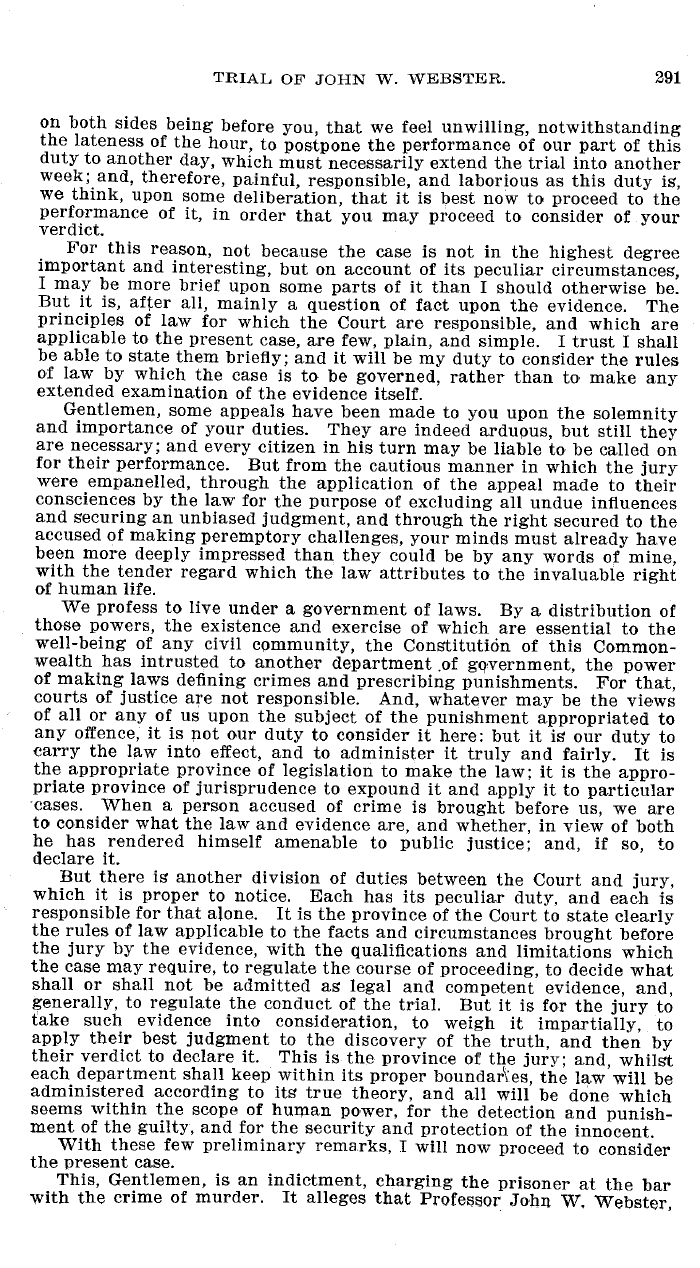|
TRIAL OF JOHN W. WEBSTER. 291
on both sides being before you, that we feel unwilling, notwithstanding
the lateness of the hour, to postpone the performance of our part of this
duty to another day, which must necessarily extend the trial into another
week; and, therefore, painful, responsible, and laborious as this duty is,
we think, upon some deliberation, that it is best now to proceed to the
performance of it, in order that you may proceed to consider of your
verdict.
For this reason, not because the case is not in the highest degree
important and interesting, but on account of its peculiar circumstances,
I may be more brief upon some parts of it than I should otherwise be.
But it is, after all, mainly a question of fact upon the evidence. The
principles of law for which the Court are responsible, and which are
applicable to the present case, are few, plain, and simple. I trust I shall
be able to state them briefly; and it will be my duty to consider the rules
of law by which the case is to be governed, rather than to make any
extended examination of the evidence itself.
Gentlemen, some appeals have been made to you upon the solemnity
and importance of your duties. They are indeed arduous, but still they
are necessary; and every citizen in his turn may be liable to be called on
for their performance. But from the cautious manner in which the jury
were empanelled, through the application of the appeal made to their
consciences by the law for the purpose of excluding all undue influences
and securing an unbiased judgment, and through the right secured to the
accused of making peremptory challenges, your minds must already have
been more deeply impressed than they could be by any words of mine,
with the tender regard which the law attributes to the invaluable right
of human life.
We profess to live under a government of laws. By a distribution of
those powers, the existence and exercise of which are essential to the
well-being of any civil community, the Constitution of this Common-
wealth has intrusted to another department of government, the power
of making laws defining crimes and prescribing punishments. For that,
courts of justice are not responsible. And, whatever may be the views
of all or any of us upon the subject of the punishment appropriated to
any offence, it is not our duty to consider it here: but it is our duty to
carry the law into effect, and to administer it truly and fairly. It is
the appropriate province of legislation to make the law; it is the appro-
priate province of jurisprudence to expound it and apply it to particular
cases. When a person accused of crime is brought before us, we are
to consider what the law and evidence are, and whether, in view of both
he has rendered himself amenable to public justice; and, if so, to
declare it.
But there is another division of duties between the Court and jury,
which it is proper to notice. Each has its peculiar duty, and each is
responsible for that a]one. It is the province of the Court to state clearly
the rules of law applicable to the facts and circumstances brought before
the jury by the evidence, with the qualifications and limitations which
the case may require, to regulate the course of proceeding, to decide what
shall or shall not be admitted as legal and competent evidence, and,
generally, to regulate the conduct of the trial. But it is for the jury to
take such evidence into consideration, to weigh it impartially, to
apply their best judgment to the discovery of the truth, and then by
their verdict to declare it. This is the province of the jury; and, whilst
each department shall keep within its proper boundaries, the law will be
administered according to its true theory, and all will be done which
seems within the scope of human power, for the detection and punish-
ment of the guilty, and for the security and protection of the innocent.
With these few preliminary remarks, I will now proceed to consider
the present case.
This, Gentlemen, is an indictment, charging the prisoner at the bar
with the crime of murder. It alleges that Professor .John W. Webster,
|

